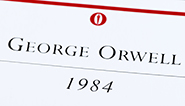5 The language of Nineteen Eighty-Four
It is a measure of the power and influence of the novel that several words and phrases, together with an adjective ‘Orwellian’, have now passed into the English language.
Activity 3
In the box below, note down as many words and phrases from Nineteen Eighty-Four that are now used in the English language. For each word or phrase, you should give an example of its usage. Which term or phrase used by Orwell do you think is the most relevant for today’s society?
Discussion
Even if you have not yet read Nineteen Eighty-Four, you will probably have come across the following words and phrases:
- Big Brother
- Room 101
- Thought Police
- Thought crime
- Newspeak
- Unperson
- Memory hole
- Doublethink
- Crimestop
What does ‘Orwellian’ mean to you?
Discussion
On the one hand, the term ‘Orwellian’ is often used to describe an authoritarian dystopia – a repressive society which exercises total control. It may also be used to refer to the ways in which language may be used to manipulate and control people.
The language used by Orwell in Nineteen Eighty-Four is one example of how the novel has stood the test of time. In the next section, you will explore its continuing relevance in today’s society.
